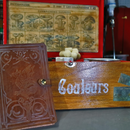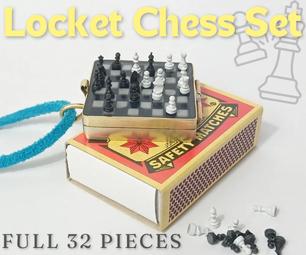Introduction: DISTRICT 9 Inspired NERF Remake
Having seen the Instructables plastic competition I was inspired to put in an entry and this was when I saw some of these Nerf IX-1 going cheap at the local supermarket in the build up to Christmas. I've seen a few conversions that make these toys look like real guns but one of my favourite films is District - 9 which if you havent seen it (????) feautures a lot of alien weaponry and with that, the NERF-9 was born.
To pull this one off I was going to need a fair few 3D printed parts and I've included these for download, as well as some tips I have picked up when making models that might be of use. Plus a bit of weathering and modelling and you could apply this to any Mod you might be making.
Step 1: Start With a NERF
So of course the first step is to take the thing apart, pictures taken now will help a lot when trying to get it back together again. The trigger mechanism was one that took a few attempts before I referred back to this picture, there is also a spring on the slide that you can see top left which needs to be placed back when re-assembling.
Step 2: Upgrade the NERF
While we have the NERF apart it would be a shame not to hop it up a bit. So the first thing to do is to remove the air restrictor and you can do this easily by pulling apart the chamber and then drilling out the center from the back with a 5mm drill. The spring also gets a little stretch and the final trick is to blockup the air hole on the dart chamber. This actually worked better than expected with the range of the NERF going from about 8m to 15M
Step 3: Front Mounted Valve
If you look at any of the real props from the movie they have these 'valve' assemblies on them and here is my interpretation of the front valve. To get the recessed parts of the valve I basically put a shaped hole through the main shell and then centered a smaller cylinder inside after. I also placed a tube around the entire cylinder set as a ole to make the alien writing flush. You can see that if you rotate the model below.
If you would like to try the tinkercad files yourself, this is the link : https://www.tinkercad.com/things/dyO6TgWiNyx
Attachments
Step 4: Side Grips
The sides of the NERF also needed some thing extra and I measured the panels and made these side panels. One was painted in matt black, and the other was primered and then using a chrome molotow pen ,painted to give it a shiny metallic look. I rubbed down the NERF logo and then stuck these both in place.
When I am gluing I always tend to use a superglue with an accelerator, this gives a nice quick drying time and you just put glue on one part and then spray accelerator on the other and push them together.
Attachments
Step 5: Rear Bottle
With the rear bottle, pretty much the same technique was used as at the front valve. I also had to make an adpater and have included two variants in the STL files. After painting a light sanding was done to get a smoother finish on the bottle and eventually then painted and weathered.
Attachments
Step 6: Top Greeblies
One of the main features of the prop weapons are rows of cylinders on the weapons. To make assembly easy I fashioned these imported cylinders and resized them. Then placed them onto an extended rail extrusion which meant that it was easy to slide them onto the NERF. Doing it this way meant that if you wanted to in the future you can slide them off and still be able to disassemble the gun.
Attachments
Step 7: Muzzle Flash Suppressor
To add a little more to the basic NERF I drew up a Muzzle flash suppressor. This is almost a good push fit onto the front of the NERF, but a touch of superglue means that its unlikely to be knocked off. It has a large enough bore as well so as not to interfere with the dart.
With this design , there are radial slots and this repeat of a radial element is something that is easy to do. The video below shows how I tackle this and put in some good looking slots
If you want to experiment with the file yourself, here is the tinkercad link
Step 8: Primer and Prep
I've been trying out different paints and for this I used a Montana gold primer spray for the main body, It goes on a little thick but does thin out after drying and these are cheaper paints than using the normal car spray paint. For the rest of the printed parts however I tended to use just normal car primer. Once everything was primered it was time to paint and a standard gloss appliance spray was used. Probably the last time I use it at it went on rather thicker than hoped and wasnt very good for finish and prone to running. I've painted boxes before with it and it was fine,but I think I'll stick to either normal car paints or montana gold sprays in future. In the first instance i was going to have the olive colour as the main body, but then changed and resprayed it all white.
Step 9: Textured Grip
This was a first as well, using truck bed spray for the grip. It came out far better then expected as well. It gives a really nice textured rubbery feel to the grip and looks very realistic. I'll be using this more in the future for sure. When you pick this up now, the grip certainly doesnt feel plasticky. Look at some of the other pics up close and you can see the rough texture this paint gives when it dries.
Step 10: Masking Colours and Blu-tack
Another tip ! Use blu-tack for complex curves , it lets you get right up close to the edges and then you can use masking tape to fill in the spaces. I refuse now to buy cheap masking tape as it invariably loses its stick, or refuses to come off the roll in one piece.
One of the things that I discovered was that aircraft modellers use blu-tack to mark out camouflage on their models before painting. Sadly there was nothing like that on this but I'm going to find something to give it a try as it would be very tricky trying to do that with masking tape. However it did work well for masking the grip area off.
Step 11: NERF Assemble
Naturally you have to do a bit of knolling and laying it all out as well gives you a pretty good idea what it will look like when the assembly starts.
Step 12: Weathering
This is always the fun part if you want to make something that looks pretty used. I normally start with an ink wash, which I make from a drop of ink and a lot of water. This brushed on will give plenty of grime and also soaks very nicely into cracks and mould lines. I have a lot of rust inks. but came to the realisation that this didn't really require any rust. After the wash dried, i did apply some weathering powder (which will end up going everywhere) and then smeared some burnt umber acrylic wiping most of it off and leaves a nice muddy type residue.
Step 13: Metal Gouges
This is another weathering technique that I love doing. All you need to do is to take a scalpel or file to the corners where its likely to have been knocked and then colour in those freshly exposed areas with either a chrome pen, or a silver sharpie. It gives the impression that the paint has been scraped showing the raw metal underneath.
Step 14: Logos and Decal Fix
One of the final touches was to print out some alien District-9 logos and then glue them in place. I use a roket card glue for this. Is superb for paper and card and dries really strong and fast and doesn't stain. Its also very thin so you don't get any raised effect. To make the paper stay in place and keep its colour I then use some decalfix which sort of works in this case like a coat of varnish.
Step 15: Knock Up a Stand
To finish off and have somewhere to display it I just used a coat hanger bent to shape and some holes drilled in a piece of offcut wood that was around. In the end I flipped the wood over and rubbed in some antique wood rubbing. I found a copy of the pass online and printed it out and got it laminated.
https://www.flickr.com/photos/26723739@N00/4032684...
Hope this has been of some help and perhaps some of the tips are new to you as they were to me.

Judges Prize in the
Plastics Contest
















